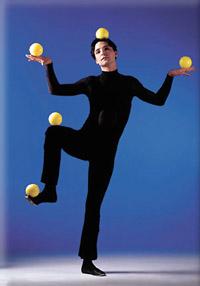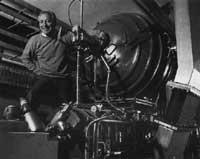‘To Physics Square’ instead of participating
2000/05/30 Roa Zubia, Guillermo - Elhuyar Zientzia
The development of science in Europe is in doubt. This plan, called Physics on Stage, is spreading here as Plaza de la Física. It is a program organized by several leading European entities in technology and research: CERN (Particle Physics Laboratories in Europe), ESA (European Space Agencies) and ESO (Southern European Hemisphere Observatories). These organizations use the support of organizations such as the European Association for Astronomy Education to overcome their difficulties of approaching society. In fact, here we have received information from the Association for the Teaching of Astronomy (AIrE).
The overall objective of the programme is to promote physics in Europe. Scientific issues in general are difficult and heavy in society. This mentality is being progressively reflected in the educational field. In fact, in the most advanced countries, especially in Germany and England, physics students have declined considerably. And the tendency to shrink further is evident.
Before the problem becomes serious, they have decided to promote science throughout Europe. Scientists are needed now and in the future. If the current trend does not change, the United States and Japan will have to resort to research and develop new technologies. This plan arises from this need.
Plan underway
The Plaza de la Física plan has been launched in twenty-two European states. A commission of six people has been created to disseminate the plan in each state. Two types of actions have been prepared for the dissemination of the project. On the one hand, during these months there will be much talk about physics in the media. For example, the committees have organized talks on scientific issues. On the other hand, it is intended to collect ideas for the dissemination of physics through a tournament.
Following the State competition, the best ideas will meet at CERN headquarters in Geneva from 5-10 November. The contest will be divided into five sections that collect old methods (public exhibitions, etc.) and modern (websites, videos, etc. ). Anyone can participate in this contest. It is not an exclusive option for scientists or teachers, but for anyone who has ideas for the diffusion of physics. The language data should also be mentioned. Although it is necessary to present a summary in English, the project can be presented and developed in any European language. Also in Basque, of course.
Each State has a number of representatives according to its population. Regarding the Basques, 30 and 40 works will be selected in the Spanish and French states, respectively. To participate in the first phase, the deadline for delivery of the work ends on July 15.
With this plan, in addition, citizens can know physics (and general science). Given that the current scientific culture is scarce, it is intended to expand this area. It's about showing street people that physics (and science) can be interesting and fun. Physics is essential for the development of the technological field.
Loss of education
It is intended that educational curricula are more important to physics. Although science is increasingly widespread in our society, ignorance is growing. "If we do not know the masterpieces of the famous painters, we will be ashamed. But if we don't know the works of prestigious scientists, no," explains Eduardo Zabala, a member of AIrE and a member of the plan's committee. "Physics in Europe is a cultural heritage. It can be said to a greater extent than literature. Physics became science four centuries ago."
Eduardo Zabala is a professor at the Ondarroa Institute and knows the problem closely. It shows a clear tendency to exclude science. "With educational reform the scientific level has decreased considerably. Even when you learn computer science, you don't really learn computer science but use applications. In addition, we have very few hours of class in the field of science."
The contest rules are available at the following internet addresses:
www.ific.uv.es/fa2000
www.estec.esa.nl/outreach
The information can be requested in the following email:
physicaenaccion@hotmail.com

Gai honi buruzko eduki gehiago
Elhuyarrek garatutako teknologia






